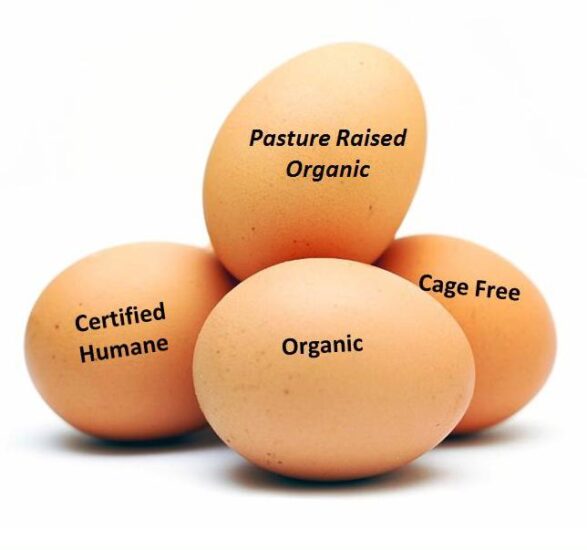See all Jane’s recipes that use Eggs
It’s surprising to see the many captivating terms on egg cartons. If you don’t have time to figure them out, here is an easy guide:
Pasture-Raised Organic Eggs are Best!Studies show that organic eggs from hens raised on pasture offer better nutrition than other supermarket eggs. Research also demonstrates that eggs from free-range, grass-fed chickens contain more nutrients than caged birds. Healthy eggs have a thick shell that’s hard to break, bright orange yolks, and a delicious flavor. Pasture-raised organic eggs are usually more expensive, because they simply cost more to feed and raise.
OK, What do the Legal Terms Mean?
Pasture Raised – Hens must get at least 30 % of their dry-feed from pasture grazing outdoors. However the remaining 70% or their diet is not regulated, and might be gmo grains. The best pasture-raised hens roam freely outdoors. There they can forage for their natural diet, like seeds, green plants, insects, and worms.
Organic – These hens are fed a vegetarian certified organic diet. This means they eat no pesticides or gmo grains. Hens are un-caged, but that does not mean they have space to walk around. And it doesn’t mean outside.
Free Range – Hens must be allowed some access to the outdoors. But there are no requirements regarding how much time they spend outdoors, or the quality or size of the outside area. So this term is vague and doesn’t necessarily indicate a healthy environment of the chicken. “Free range” tells you nothing about the chicken’s diet, so chances are she’s eating GMO grains.
Certified Humane – Hens are un-caged and inside, with less crowded conditions than some. This tells you little about her ability to move around or her diet.
Cage Free – Hens live un-caged, typically inside and may never see the outdoors. Since diet is not addressed in this term, you can assume they’re most likely eating gmo grains.
Vegetarian fed – This is not a regulated term, so your guess is as good as mine. These hens are usually fed genetically modified grains, no animal parts, with no pasture grazing.
Omega-3 eggs – This term does not necessarily indicate healthiereggs. Hens are often fed low quality omega-3 fats that are already oxidized, and offer no health benefit. In fact they can be detrimental to your health. Omega-3 eggs are more perishable than other eggs. For these reasons some doctors recommend you save your money and skip the Omega-3 eggs.
Fresh – This is not a regulated term in the USA. Eggs are typically at least 3 weeks old by the time they go on the grocery shelf. In the European Union, most of the UK and parts of Australia, each egg is date stamped. However in the USA, it’s hard to know how old an egg is. You’ll find the freshest eggs at a local farm or friend with chickens.
Natural or Naturally Raised – This term is not regulated for chickens, so it is meaningless.
Fertilized – This is not a legally regulated term, but interesting to know that hens can lay eggs even if a rooster isn’t around. For an egg to be fertilized, the hen and rooster must mate 1-7 days before the egg forms. If the hen has not mated then the egg will be unfertilized. Both fertilized and unfertilized eggs are great to eat. Once a fertilized egg goes in the refrigerator, the chick’s development stops. To see if an egg is fertilized, hold it up to the light and you’ll see blood spots and the embryo. Once it is cracked, you’ll see a defined white circle and tiny red lines on the surface of the yolk. I can’t find any evidence that fertilized eggs are more nutritious, however they are definitely sexier.
Where to Buy Pastured-raised Organic Eggs?
The best way to find high quality eggs is to buy them from a local organic farm or a farmers market. It’s good to meet your producers face-to-face. Even better -Visit the farm, meet the chickens and gather the eggs yourself! Check out these websites for local sources of eggs: Local Harvest, Farmers Market Zip List, Eat Wild.






No Replies to "Eggs"